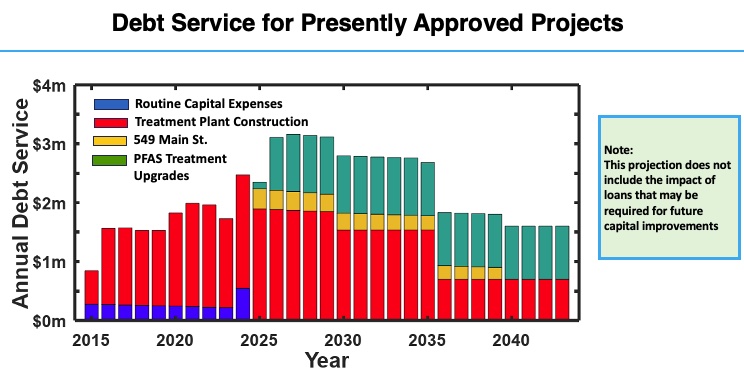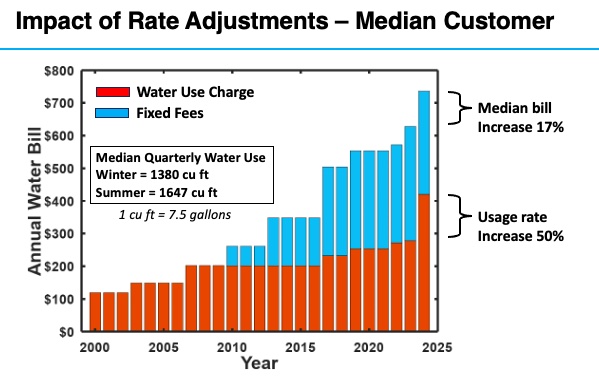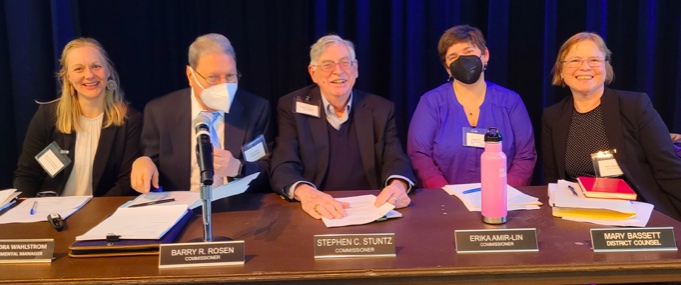A sparse group of about a dozen Acton voters gathered on Wednesday, March 20, for the Annual Meeting of the Acton Water District (AWD). The AWD is a separate municipal entity from the Town of Acton, with its own governance structure. AWD Annual Meeting is analogous to Acton Annual Town Meeting, and the AWD Board of Commissioners is analogous to the Town Select Board.
After the call to order by Moderator William Mullin, the longest-serving commissioner Stephen Stuntz read a testimonial to retiring District Counsel Mary Basset. Basset, said Stuntz, had worked for the District since the mid-1990’s, and “served us well, with patience and humor, easing some of the tensions that come up occasionally.”
Then, in a departure from prior years’ proceedings, the AWD Finance Committee (FinCom) presented an overview of the AWD financial history to provide a context for the warrant articles. John Petersen, speaking for the FinCom, walked the audience through the District’s $38.4 million capital investments in water treatment plants in North Acton (2010), South Acton (2015), and Center Acton (2022). Beginning in Fiscal Year (FY)’25 and ramping up sharply in FY’26, the District will begin paying down new debt for upgrading all three of the treatment plants to filter for PFAS, an emerging contaminant type also known as “forever chemicals.” Total debt service is projected to be around $3M per year from FY’26 through ’30.

Petersen then reviewed how the cost of AWD water has risen over the years, illustrating his comments with the case of a hypothetical residential customer who has taken the average (median) amount of water each year since 2000. As shown in the FinCom graphic, at the turn of the century the bill of this hypothetical customer would have been just over $100 per year, and it has risen to approximately $700 per year. In 2010, when the first water treatment plant came on line, the AWD introduced a fixed fee, uniform across all customers, to service the debt associated with capital costs of water treatment. The debt fee portion of the bill has stepped upwards as new treatment plants have been completed. For FY’25, there will be a step upward in the Water use charge, the portion of the bill that scales with amount of water used. Petersen said that a median customer will see a bottom-line rate increase of approximately $100 per year for FY’25; most customers will see increases in the range of 17-20%.

Following the FinCom presentation, Moderator Mullin led the voters through a consideration of twenty-four warrant articles. Most dealt with spending. With minimal discussion, voters agreed unanimously to authorize transfers of funds to enable spending on maintenance and repair of the various treatment facilities; to clean and rehabilitate existing wells; for replacing old water mains, renewing old water services, and replacing old fire hydrants; for repairing emergency water main breaks; for the replacement of filtration media at the District’s water treatment plants; to pay costs of improvements to the District’s water system and water mains; to pay for lease payments for the North Acton Water Treatment Plant PFAS Filter system; for purchase of a vacuum tank trailer truck; for the acquisition of a new general service vehicle; to fund health insurance benefits for retirees; for costs associated with replacing the roof at the District’s office building at 693 Massachusetts Avenue; and for costs associated with upgrades to the District’s water tank at 287 Nagog Hill Road.
Article 21 authorized $75,000 for “costs associated with obtaining a study of water supply alternatives available to the District.” As explained by the Commissioners and FinCom, this study will investigate the possibility of Acton joining the Metropolitan Water Resource Authority (MWRA). FinCom’s comments on the article stressed that the study would be discussed with the community and would enable long term planning. Comments from voters urged the District to scrutinize costs and not rely on the cost estimates from MWRA, and to “get on the same lane” as the Town of Acton with respect to new development planning. One of the Commissioners replied that the District was in communication with Town Government around potential future developments and that this topic would soon be discussed at an upcoming meeting of Commissioners. [Editor’s Note: At their March 25 meeting, the AWD Commissioners discussed the three zoning articles proposed for Acton Town Meeting and their implications for water demand.]
The only article that did not pass unanimously was Article 22, “to authorize the Commissioners to enter into a long-term written lease … for use of a cell tower on a portion of the land owned by the District located at … 287 Nagog Hill Road.” The objection was that the neighbors had not been notified of this vote. The District Manager explained that abutter notification was not required at this step, which was merely about authorizing the District to issue a Request for Proposals; before a cell tower could be built, the Town would have to hold a public hearing, with abutter notification. After discussion, the article passed on a voice vote.
Article 23 sought $500K to pay “costs of implementing the recommendations of the Lead Service Line Inventory and Replacement Plan.” As explained by AWD Environmental Manager Alexandra Wahlstrom, this is a new expense for the AWD, required by the federal Environmental Protection Agency’s (EPA’s) Lead and Copper Rules Revision. The EPA’s goal is to “make rapid progress on removing harmful lead from America’s drinking water.” When asked what actions would be taken in response to the inventory findings, Wahlstrom said that was not yet known and would depend on what the inventory finds and on EPA rule-making still in progress. As previously reported by the Acton Exchange, the AWD is aware of no lead service lines in Acton.
The final article requested a revision of the AWD bylaws. The most substantial proposed changes were in the Outdoor Water Use Bylaw, and the Bylaw to Reduce Local Daily and Seasonal Peak Water Use. The revisions codify and strengthen the restrictions on water use during times of stressed water supply and were required by the Massachusetts Department of Environmental Protection in order to renew the District’s Water Management Act Permit. Acton water-takers will not experience an immediate change in their access to water for outdoor use, since these same restrictions have been in place for the last several years as part of the District’s PFAS control program. Since the bylaws were being revised anyway, the Commissioners took the opportunity to update some old-fashioned language around gender, at the urging of the incoming District Counsel Spencer Holland. “He” became “the person”; “his” became “the person’s”; and “Selectmen” became “Town of Acton Select Board.”
Kim Kastens is a writer, editor and Board member for the Acton Exchange. She also chairs the Water Committee of Green Acton.



